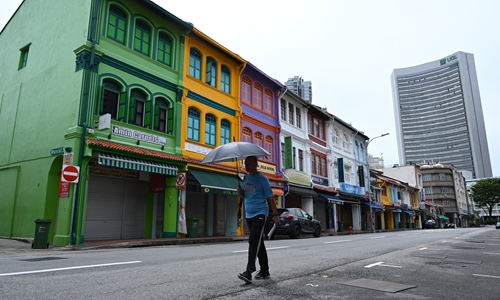Singapore’s virus spike ‘unlikely to impact China’
By Wang Qi and Xu Keyue Source:Global Times Published: 2020/4/21 22:58:40

A man walks along an empty street in Singapore on Tuesday as the country ordered the closure of all businesses deemed non-essential as well as schools to combat the spread of COVID-19. Photo: AFP
Concerns of imported cases from Singapore have risen in China after health authority in Southwest China's Chongqing Municipality reported one asymptomatic infection case from Singapore on Sunday.
Although it still remains unknown how the patient returned to China from Singapore, observers believe the second wave in Singapore is unlikely to have a great impact on China with stricter measures taken by both, but every country in the world should prepare for a long haul combating COVID-19.
Considering hundreds of thousands of Chinese working in Singapore, where the situation is worsening, many worries that more Chinese would come back to China and result in a potential new wave of imported infections like what has happened in Northeast China's land port Suifenhe.
Singapore Prime Minister Lee Hsien Loong addressed on a briefing Tuesday afternoon that the circuit breaker to choke off the outbreak will be extended by another month, and existing measures will be tightened until May 4, after the country announced 1,111 new COVID-19 cases on Tuesday, taking its total number of cases to 9,125, Singaporean media Strait Times reported.
Singapore reported 1,426 new cases of COVID-19 on Monday, the largest increase in a single day. Out of the total, 1,401 are foreign workers holding the work permits, and 25 took place in the local communities. Foreign workers, mainly from India, Bangladesh, and China, account for nearly three-quarters of the total infected cases in the country, Chinese news portal thepaper.com reported. Some analysts said the dorm condition for overseas migrant workers has caused Singapore's second wave, as over 1,369 new infected patients live in workers' dormitory, with more crowded and public-share space and less hygiene facilities. Lee said they will work hard to contain the spread of COVID-19 in the dorms, and look after the well-being of the migrant workers
Jennifer Huang Bouey, a senior policy researcher in China Policy Studies at the RAND, told the Global Times at a previous interview that the rebound of an outbreak in Singapore shows that the existing policies could only limit the outbreak to a certain extent, and the complete "zero cases" is extremely difficult for any countries and regions to achieve before the mass vaccination could be administered.
She noted that the battle against novel coronavirus is a protracted war, far more than just keeping alert for the second wave or even the third wave. There are continuous needs for countries to monitor and reduce public mass gatherings for a long time.
Zhuang Guotu, head of Xiamen University's Southeast Asian Studies Center, told the Global Times on Tuesday that infections from Singapore are unlikely to become the main source of imported cases in China as both countries have adopted efficient measures to deal with the pandemic.
Embassy of China in Singapore, which suspended the service at its consular service hall and China visa application service center on Monday, said it has kept close contact with Singapore's health authority and a dozen Chinese patients were recovered with good care from Singapore's medical personnel.
Singapore has strictly restricted the outbound flights. One flight a week to China is permitted currently, the only legal way to enter China, which can control the potential spread of the coronavirus, Zhuang noted.
Zhuang said there are about 200,000 Chinese works in Singapore. However, according to data from the Economic and Commercial Office of the Chinese Embassy to Singapore, in 2017, there were about 150,000 Chinese workers in Singapore, accounting for 10 per-cent of all the overseas workers in the country.
The Chinese Embassy donated at least 60,000 masks to Chinese workers in the country on April 17, according to the embassy's official website. Chinese companies in Singapore have donated over 150,000 masks to Chinese citizens in Singapore.
The embassy also issued a notice on April 6 to all overseas Chinese in the country, reminding them to follow the rules and regulations of Singapore and to protect themselves through fewer goings-out, wearing masks, washing hands often and avoiding mass gathering after the Singaporean government announced to apply stricter management to curb the epidemic, including locking down non-necessary places.
Chongqing recorded zero new imported cases on Monday. There are in total of three imported cases and 20 asymptomatic infections existing in the municipality. No other imported cases from Singapore have been found in China as of press time, China Central Television reported.
Newspaper headline: Singapore’s virus spike unlikely to affect China
Posted in: DIPLOMACY